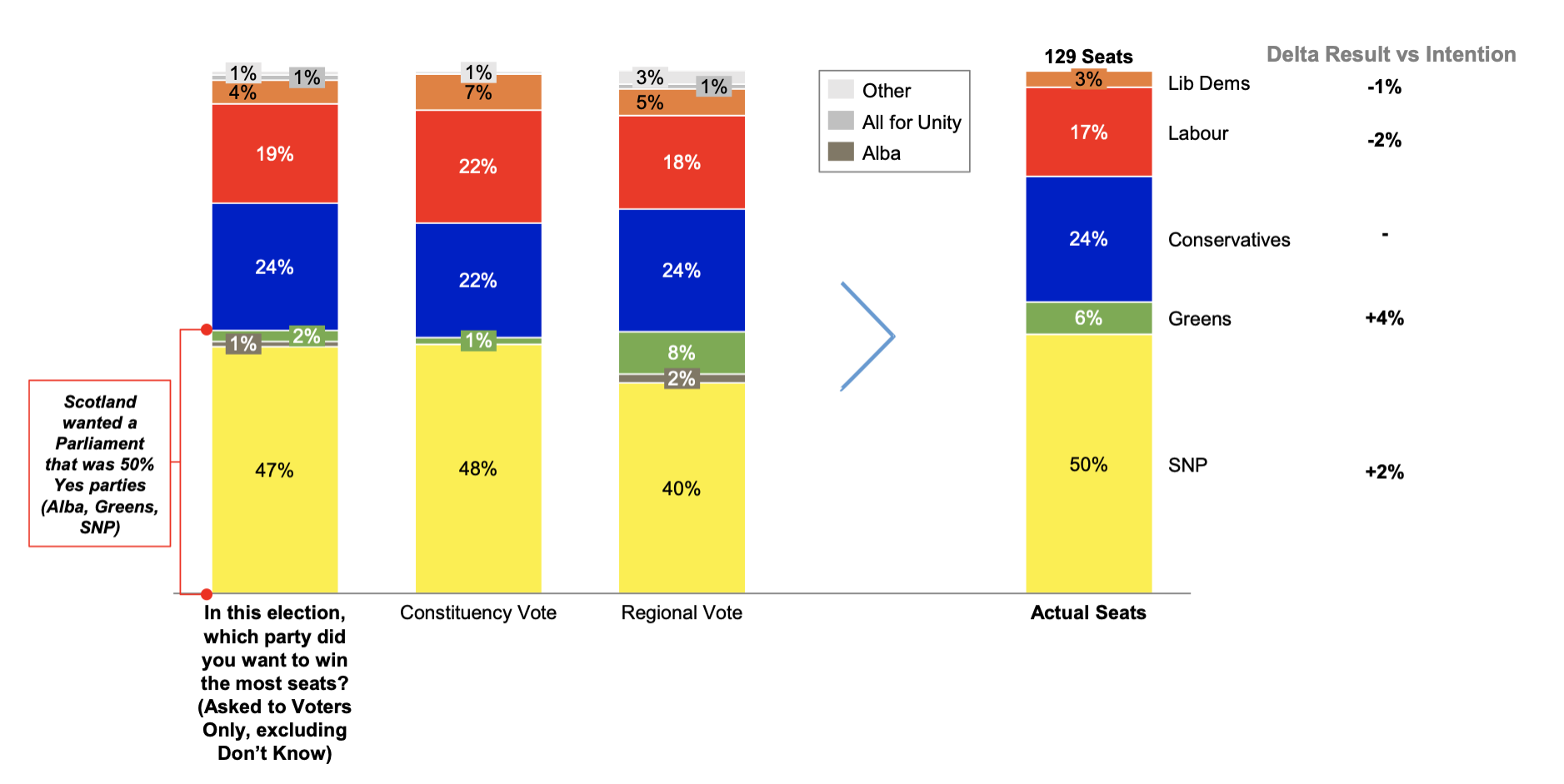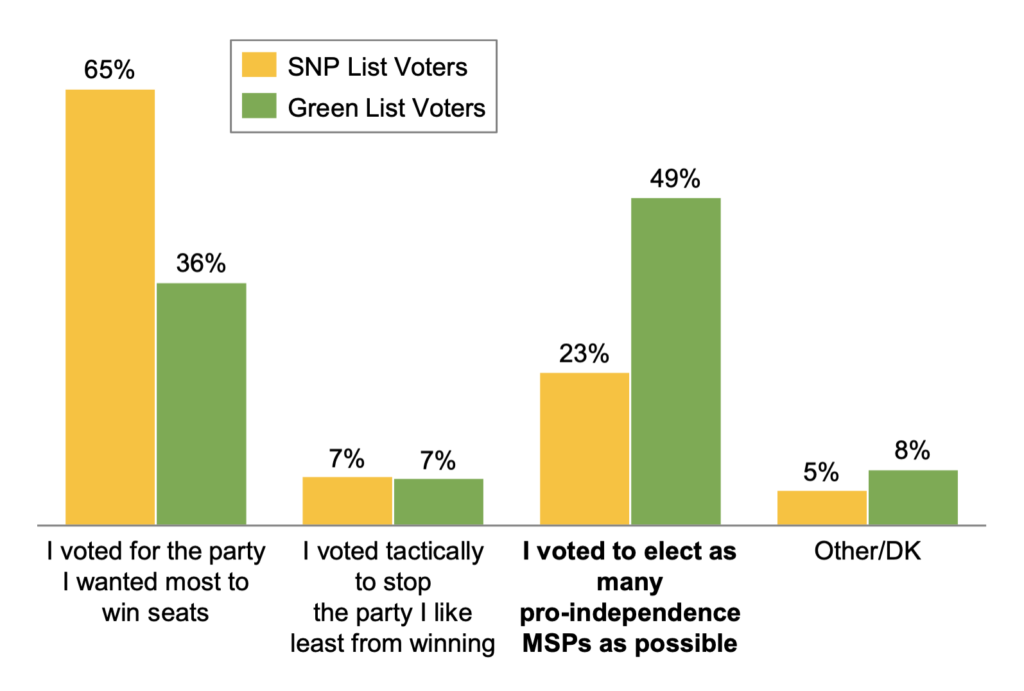Not a vote has yet been cast in the Scottish Parliament elections, scheduled for May 5th. So confident that a nationalist majority is already in the bag, however, the pro-independence campaign is already planning life after victory. An 11-point plan has been published on how to take forward a referendum. We are told that the as yet un-won majority the SNP expects to win will be evidence of Scotland’s desire to leave the United Kingdom. It shows – or will do, once it happens – that Scots want another referendum immediately. The SNP contend will be a democratic outrage if a British Prime Minister refuses to agree to one.
The polls suggest the SNP is not wrong to be confident; a pro-independence majority is what impartial observers currently expect too based on current polls. But is the pre-emptive reading of the outcome correct? In this uncertain world, the truth is that the picture in Scotland is less clear-cut than the SNP tries to claim. Of course many pro-independence Scots believe a 2nd referendum cannot come soon enough. They see the Union is a dead marriage. They therefore want a vote to confirm divorce immediately. Yet other, less certain independence voters are not so gung-ho. Some feel that the SNP should stick by its promise that the 2014 was once in a generation. Others, like former SNP MP Jim Sillars, do not think it’s a good idea to have a referendum any time soon, not when there’s a pandemic on. Many worry about the economic uncertainty and the social division that independence would bring with it, in addition to everything else. Indeed, it’s hard to avoid the sense that many are open to waiting a little, to let the dust settled, and see if something else might turn up. As one lady said in November: “I think we need time to heal. I think we should wait to see if there is changes to Westminster. We gave our word (on once in a generation) and said we will wait. Although I’m a Yes voter, if there are changes in Westminster surely that’s good for us.”
So as we head towards the elections, the question turns to how the UK Government should speak to these wary, sceptical voters. The Prime Minister has already made it clear he does not intend to support a 2nd referendum. If the SNP does indeed win a majority in the elections with a pledge to hold a referendum it will, as sure as night follows day, make political hay with that. So what should Ministers do to reach out to those voters in Scotland who are hoping for some kind of middle way?
A good cautionary tale from the recent past here might be the process that eventually led to Britain’s departure from the EU. Our decision to leave the EU was never pre-ordained; it was the result of a series of mis-steps by Remain-supporting politicians, and the European Union, which both failed to respond to the growing desire for real and radical change. The most obvious example came in 2015 when David Cameron undertook to seek a better deal for Britain and then put that to the referendum. As we all know, that renegotiation with the EU fell short of what was required. It failed the “smell test” back at home, convincing Boris Johnson and others to campaign for Leave. Mr Cameron’s offer looked phoney. Millions of British voters agreed, and the Brexit result followed.
This cautionary tale should be heeded with regard to Scotland too. Over the last two decades, Scots voters have been offered several renegotiated deals within the UK, from the delivery of a Scottish Parliament in 1999 to the extra powers provided in two more Scotland Acts since. These have been sold as a way to “kill nationalism” for good. But just as Mr Cameron’s tweaks to the UK’s relationship with the EU failed to convince people to remain in the EU, so the deals in Scotland haven’t stopped the appeal of departure from the UK too.
There are plenty of good reasons for pushing more power out of Westminster to the more outlying part of the UK beyond the M25 and, in my view, it’s a process that should continue. But the clear evidence of the last two decades is that stopping the appeal of Scottish independence is not one of them. Just as with the Britain’s relations with the EU, the reform that’s required is deeper. Scots (and many others across the UK) are looking for evidence of real and genuine change from the institution that lies at the heart of the problem: not the distant and unresponsive European Union in this case, but the distant and unresponsive Westminster machine, and a political culture which – despite devolution – still centralises power, seizes too much control for itself, and dodges accountability, making many people in Scotland (and elsewhere in the UK) feel powerless, disrespected and ignored.
Unionists may not want to admit it, but this deal currently fails the same “smell test” to many Scots (as well as many people across the UK too) as Mr Cameron’s EU deal did six years ago. Little wonder their response to it, to coin a phrase, is “No, No, No”. It follows that if all the UK Government does in response is to shout ever louder about the benefits of the United Kingdom and warn Scots about the costs of leaving the British single market, then they risk repeating the exact same errors made by the UK establishment who fought for Remain. And if all they do is diminish “Leave” voters in Scotland, then they should not be surprised when such people dig in their heels and stick up two fingers. There’s a great irony in all of this. In this battle, it’s Boris Johnson’s misfortune to be playing the role of the pro-Remain establishment. He is cast by the SNP as Jean-Claude Junker, or Jacque Delors. He, more than anyone else alive in British politics, should be aware of the perils of being cast in such a part when there are skilful political campaigners on the opposite side waiting to take merciless advantage.
None of this is say that the UK Government should not set out the risks of Scotland leaving the UK; of course, it should. It should also, of course, seek to demonstrate the very real benefits of the Union to Scotland – benefits which have been so vividly demonstrated in recent weeks by the government’s vaccination programme. Only that more is required than a reheat of Remain style tactics from 2016. To continue the EU analogy, Mr Johnson needs to learn from Mr Cameron five years ago. As former Prime Minister Gordon Brown has set out in detail, we need to be prepared on behalf of the entire nation to reflect and look again at how we “do” Britain. We need to see a sign that the UK political establishment “gets it” – that it understands peoples’ sense of alienation from the UK and wants to remedy that. That’s unlikely to be through a formal federal system which, given the UK’s uniquely complex nature, won’t work, but by creating better inter-governmental structures, reforming outdated institutions, and switching Whitehall on to life outside SW1.
Many Scots, in my experience, would welcome a more nuanced conversation about Scotland and the United Kingdom than the Black and White, Yes v No framing of the debate as engineered by the SNP. They saw Manchester mayor Andy Burnham protesting about the centre of power last year and noticed he expressed many of their own frustrations. They accept therefore that this is a more complex picture than the SNP would like to suggest. The UK Government should “lean in” to the SNP’s diagnosis of the United Kingdom. It should commit to going out to listen to voters in Scotland – and elsewhere in the UK – about what they want. In this regard, as well as learning lessons from Mr Cameron’s failed attempts five years ago, Mr Johnson might want to borrow ideas from the SNP as well. Back in 2007, when it was still trying to turn the fringe notion of independence into a mainstream concept, Alex Salmond and Nicola Sturgeon began what they described as a “National Conversation” – an attempt to consult people across Scotland prior to the publication of a white paper on a proposed referendum. Perhaps it’s time to take a leaf out of their book, with a new UK wide National Conversation to be held this year. It would acknowledge how the last few years have caused upheaval and uncertainty for many communities and created division across the United Kingdom. It would seek to involve all political parties, including the SNP, in setting it up – indeed Sir Keir Starmer and Mr Brown are already pressing ahead. As with Citizens Assemblies in Ireland, it might try to gain an understanding of that division and to discover the kind of change they want in the years ahead. In order to acknowledge the depth of the problem, it should accept that nothing is off the table, including – in time – the possibility of another Scottish referendum.
Such a UK wide conversation would send a clear message that the UK Government is responding to what is a UK wide problem, felt most deeply perhaps in Scotland, but certainly not exclusively. It would ask how, and whether, Britain can go forward, together. Many of us across the UK are looking to see whether our country is prepared to change. We’re looking to see whether Britain is a still a country that can hold such a conversation.
As we begin 2021, Scotland is a nation questioning whether it needs to become a state. The answer may lie in whether the UK state can show it’s still a nation. That starts not with phoney change, but by accepting the need for real and lasting reform. When Eurosceptics began their campaign for a new relationship with the EU, they settled on a slogan: “Change or Go”. Their point was clear and principled: either we had proper reform of the EU, or it was time to accept that Britain had to leave. The change offered was piecemeal, so we decided to go. The same message applies now to Scotland and the UK. We need to change our own Union, or else Scotland may decide it’s time to go too. No matter what happens in the Holyrood elections this year, that’s the choice on offer.
This article appeared originally as part of Policy Exchange’s new series on the Future of the Union.













